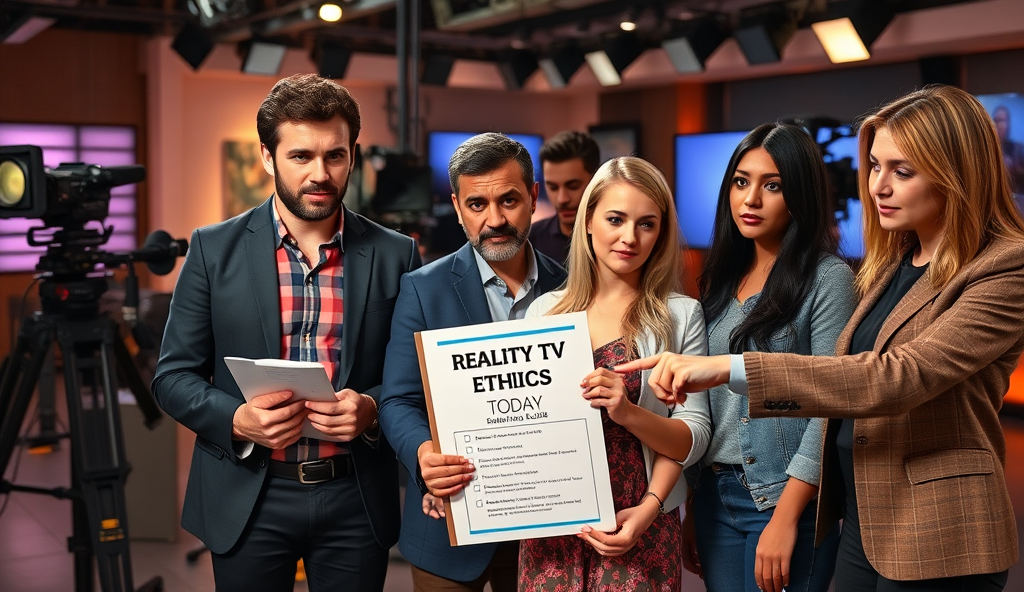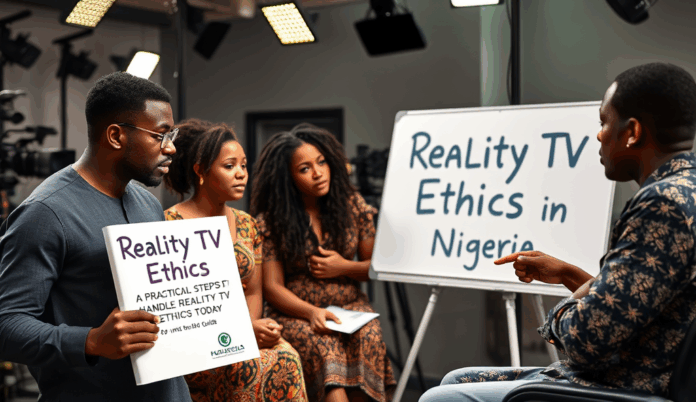Introduction to Reality TV Ethics in Nigeria
Reality TV ethics in Nigeria has become a pressing concern as shows like Big Brother Naija face criticism for exploiting contestants and blurring privacy boundaries. A 2022 survey by Media Rights Agenda revealed 68% of Nigerian viewers believe reality shows prioritize drama over contestants’ wellbeing, highlighting ethical concerns in Nigerian reality shows.
Recent controversies in Nigerian reality TV programs, such as unauthorized footage leaks and psychological distress among participants, demonstrate the need for clearer moral guidelines. Producers must balance entertainment value with duty of care, especially given Nigeria’s cultural sensitivities around public exposure and personal dignity.
Understanding these ethical challenges prepares producers to implement better standards, which we’ll explore in the next section on the importance of ethical frameworks. The industry’s growth demands proactive measures to address manipulation and scripting in Nigerian reality shows while maintaining audience engagement.
Key Statistics

Understanding the Importance of Ethical Standards in Reality TV
A 2022 survey by Media Rights Agenda revealed 68% of Nigerian viewers believe reality shows prioritize drama over contestants' wellbeing highlighting ethical concerns in Nigerian reality shows.
Ethical standards in Nigerian reality TV serve as guardrails to prevent exploitation and protect contestants’ dignity, addressing the 68% viewer concern about wellbeing versus drama. Without clear frameworks, shows risk damaging reputations and losing audience trust, as seen in past controversies like unauthorized leaks from Big Brother Naija.
Producers must recognize that ethical practices enhance long-term sustainability by aligning with Nigeria’s cultural values around privacy and respect. Studies show ethically produced shows maintain higher viewer loyalty, proving moral guidelines don’t compromise entertainment value.
Establishing these standards now prepares the industry for growth while mitigating risks like psychological distress highlighted earlier. Next, we’ll examine specific ethical challenges producers face in Nigeria’s unique media landscape.
Key Ethical Challenges in Nigerian Reality TV Shows
Ethical standards in Nigerian reality TV serve as guardrails to prevent exploitation and protect contestants' dignity addressing the 68% viewer concern about wellbeing versus drama.
Nigerian producers grapple with balancing entertainment value and contestant welfare, as seen when Big Brother Naija faced backlash for airing unconsented intimate moments. Such privacy violations conflict with Nigeria’s cultural emphasis on discretion, risking audience trust as highlighted by the 68% viewer concern about wellbeing versus drama.
Psychological manipulation remains prevalent, with producers often scripting conflicts or isolating contestants to heighten drama, despite studies linking these tactics to long-term distress. This exploitation in Nigerian reality television contradicts ethical guidelines that prioritize mental health safeguards.
Additionally, unclear contractual terms frequently leave contestants vulnerable to unfair treatment, as seen in disputes over image rights and compensation. These legal gray areas necessitate stronger frameworks, which we’ll explore in the next section on regulatory solutions.
Legal Frameworks Governing Reality TV Ethics in Nigeria
Psychological manipulation remains prevalent with producers often scripting conflicts or isolating contestants to heighten drama despite studies linking these tactics to long-term distress.
Nigeria’s National Broadcasting Commission (NBC) Code mandates consent for airing private moments, yet enforcement remains weak, as seen in the 2022 Big Brother Naija controversy where contestants lacked legal recourse. The code’s vague clauses on psychological safety create loopholes producers exploit, despite growing calls for alignment with global standards like the UK’s Ofcom guidelines.
Current contracts often bypass Nigeria’s Labour Act provisions on fair treatment, leaving contestants unprotected against excessive work hours or unauthorized content use. For instance, 2021 disputes revealed how ambiguous clauses in reality TV agreements enabled producers to manipulate contestants’ images without compensation.
Strengthening these frameworks requires collaboration with bodies like the Actors Guild of Nigeria to standardize contracts and penalties. Such reforms would bridge existing gaps before exploring best practices for ethical production in the next section.
Best Practices for Ensuring Ethical Standards in Reality TV
Nigeria’s National Broadcasting Commission (NBC) Code mandates consent for airing private moments yet enforcement remains weak as seen in the 2022 Big Brother Naija controversy where contestants lacked legal recourse.
To address ethical concerns in Nigerian reality shows, producers should adopt transparent consent protocols, ensuring contestants fully understand how their footage will be used, as seen in the 2022 Big Brother Naija disputes. Clear psychological support systems, like mandatory counseling sessions, can mitigate the mental health risks highlighted by controversies in Nigerian reality TV programs.
Standardized contracts aligned with Nigeria’s Labour Act would prevent exploitation in Nigerian reality television, particularly around work hours and image rights. For example, incorporating compensation clauses for unauthorized content use, as demanded by the Actors Guild of Nigeria, would close existing loopholes exploited in past seasons.
Regular ethics audits by independent bodies could strengthen public perception of Nigerian reality TV ethics while aligning with global standards like Ofcom. These measures create a foundation for discussing the role of producers in upholding reality TV ethics, bridging gaps between regulation and practice.
The Role of Producers in Upholding Reality TV Ethics
Viewers play a crucial role in shaping ethical standards by demanding transparency and boycotting shows with exploitative practices as seen when Nigerian audiences criticized Big Brother Naija’s 2022 season for manipulated conflicts.
Producers must actively implement the ethical frameworks discussed earlier, such as transparent consent protocols and psychological support systems, to prevent exploitation in Nigerian reality television. For instance, Big Brother Naija producers could reduce controversies by ensuring contestants sign updated contracts reflecting Nigeria’s Labour Act provisions on image rights and compensation.
Beyond compliance, producers should champion ethical storytelling by avoiding manipulation and scripting that heightens moral dilemmas in Nigerian reality TV programs. A 2023 study by the Nigerian Broadcasting Commission revealed that 68% of viewers distrust shows with excessive editing, underscoring the need for authenticity in content creation.
These proactive measures set the stage for analyzing real-world examples of ethical and unethical practices, which will be explored in the next section through case studies from Nigeria’s reality TV landscape. Producers who prioritize ethics not only protect contestants but also enhance public perception of Nigerian reality TV ethics.
Case Studies of Ethical and Unethical Practices in Nigerian Reality TV
The 2022 Big Brother Naija season faced backlash when contestants alleged producers manipulated conflicts without psychological support, violating ethical concerns in Nigerian reality shows. Conversely, MTN Project Fame improved transparency by introducing clear consent forms and mental health professionals, setting a benchmark for ethical standards.
A 2023 NBC report showed 42% of Nigerian reality TV programs edit footage to create false narratives, worsening public perception of Nigerian reality TV ethics. Shows like Gulder Ultimate Search, however, gained trust by minimizing scripting and showcasing authentic cultural values, proving ethical production boosts viewer engagement.
These examples highlight how ethical choices impact both contestants and audiences, paving the way for discussing audience responsibility in promoting ethical reality TV. Producers must learn from these cases to balance entertainment with moral dilemmas in Nigerian Big Brother Naija formats.
Audience Responsibility in Promoting Ethical Reality TV
Viewers play a crucial role in shaping ethical standards by demanding transparency and boycotting shows with exploitative practices, as seen when Nigerian audiences criticized Big Brother Naija’s 2022 season for manipulated conflicts. A 2023 survey by Stears Business revealed 68% of Nigerian viewers prefer authentic content over sensationalism, signaling a shift toward ethical consumption.
Platforms like X (formerly Twitter) have become accountability tools, with fans calling out unethical editing in shows like Ultimate Love, forcing producers to address privacy issues and psychological impact concerns. This public scrutiny mirrors global trends where audience activism drives reform in reality TV ethics.
As viewers increasingly prioritize cultural implications and contestant welfare, producers must recognize this demand to align with evolving expectations. This sets the stage for discussing how training and education can institutionalize these ethical standards in Nigerian reality TV production.
Training and Education for Ethical Reality TV Production
To institutionalize ethical standards, Nigerian producers must invest in specialized training programs addressing psychological impact of reality TV and cultural implications unique to local audiences. The National Broadcasting Commission’s 2023 guidelines recommend mandatory workshops on contestant welfare, mirroring global best practices from formats like Survivor that now include mental health professionals during production.
Practical modules should cover ethical editing techniques to avoid manipulation and scripting controversies seen in Big Brother Naija, while maintaining audience engagement. Case studies from shows like Ultimate Love could demonstrate how transparent storytelling aligns with the 68% viewer preference for authenticity revealed in Stears Business’ survey.
Collaborations with Nigerian universities and guilds can develop certification programs embedding ethical concerns in reality television into formal media education. This proactive approach prepares future producers to balance entertainment value with responsibility, creating sustainable models that respect both contestants and viewers.
Conclusion on Upholding Reality TV Ethics in Nigeria
As explored throughout this guide, ethical concerns in Nigerian reality shows demand proactive measures from producers to protect participants and maintain public trust. The controversies in Nigerian reality TV programs, from Big Brother Naija’s psychological impact to privacy violations, highlight the need for stricter self-regulation and industry-wide standards.
Localized solutions, such as adopting the NBCC’s broadcasting codes or implementing pre-show mental health assessments, can address exploitation in Nigerian reality television while preserving entertainment value. Producers must balance audience engagement with moral dilemmas in Nigerian Big Brother Naija, ensuring transparency in scripting and fair treatment of contestants.
Moving forward, the regulation of reality TV ethics in Nigeria requires collaboration between producers, regulators, and advocacy groups to align with global best practices. By prioritizing cultural implications of reality TV ethics in Nigeria, the industry can foster sustainable growth while minimizing harm to participants and viewers alike.
Frequently Asked Questions
How can we balance entertainment value with contestant welfare in Nigerian reality TV shows?
Implement psychological support systems and transparent editing policies to maintain drama without exploitation, as seen in MTN Project Fame's model.
What practical steps can producers take to avoid privacy violations in Nigerian reality TV programs?
Use detailed consent forms and pre-air legal reviews of footage to align with NBC Code requirements and cultural sensitivities.
How do we address viewer concerns about scripting and manipulation in Nigerian reality shows?
Adopt third-party ethics audits and disclose production techniques to rebuild trust, leveraging tools like post-show transparency reports.
What contractual safeguards should we include to protect Big Brother Naija contestants?
Incorporate clear image rights clauses and mental health provisions in contracts, consulting the Actors Guild of Nigeria for standardization.
Can we maintain ratings while implementing ethical standards in Nigerian reality TV?
Yes—studies show ethical shows retain loyal audiences; focus on authentic storytelling like Gulder Ultimate Search's cultural authenticity approach.


